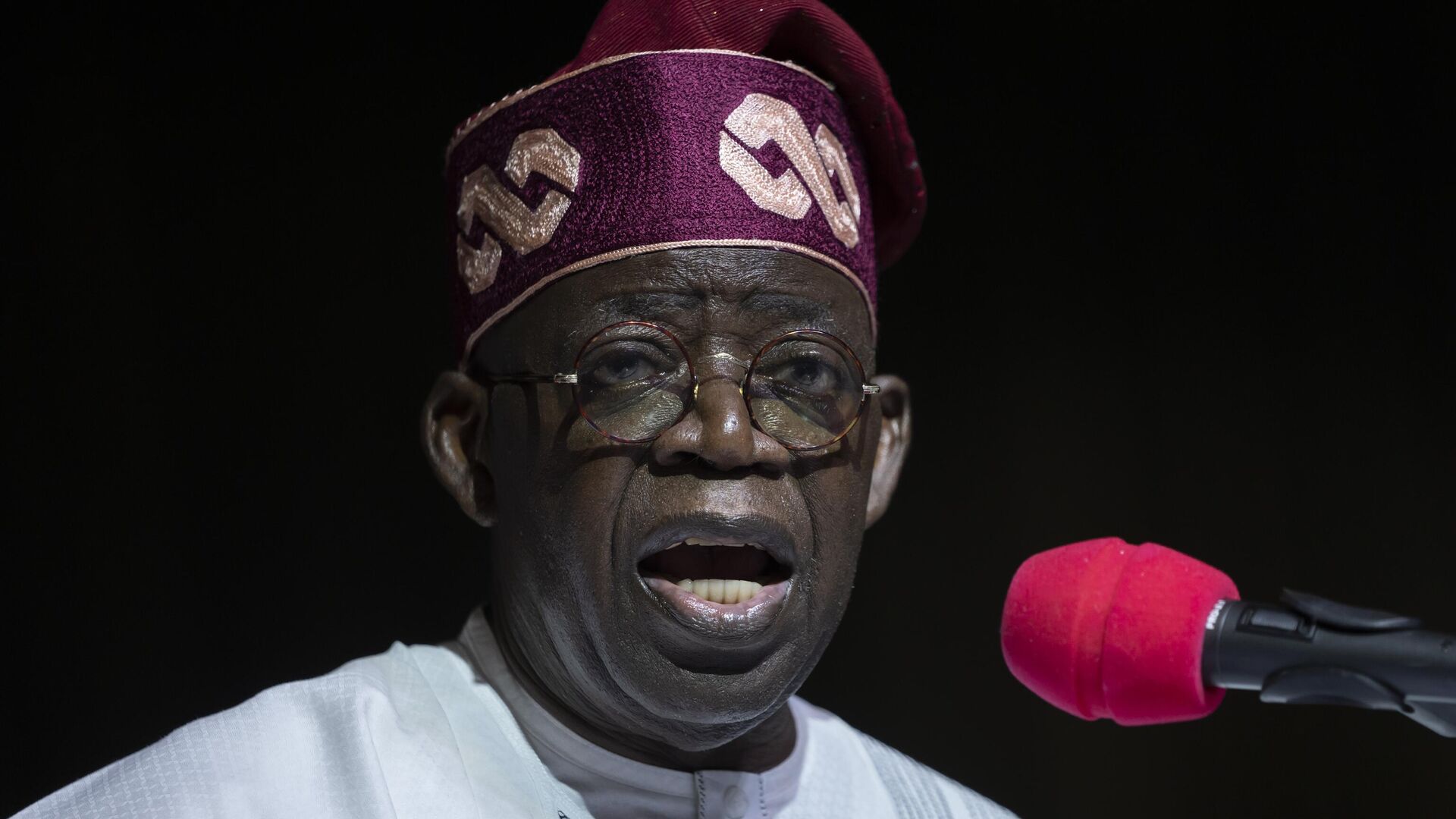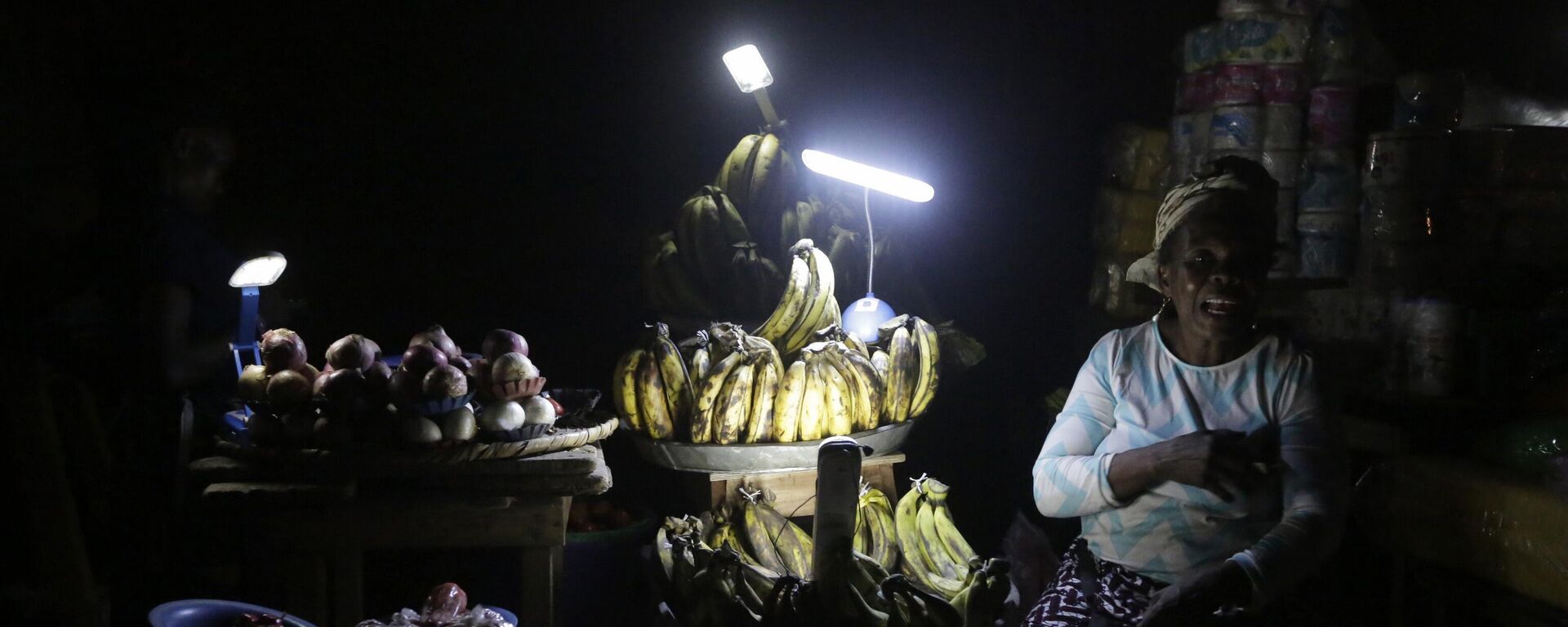https://en.sputniknews.africa/20240101/nigerias-president-tinubu-outlines-taxation-and-electricity-as-top-priorities-in-2024-1064410746.html
Nigeria’s President Tinubu Outlines Taxation and Electricity as Top Priorities in 2024
Nigeria’s President Tinubu Outlines Taxation and Electricity as Top Priorities in 2024
Sputnik Africa
In early December, it became known that the Nigerian government was considering transferring its stakes in 11 power companies to state governments in an effort... 01.01.2024, Sputnik Africa
2024-01-01T13:55+0100
2024-01-01T13:55+0100
2024-01-01T14:30+0100
sub-saharan africa
nigeria
bola tinubu
west africa
electricity
business
investment
taxes
energy
legislation
https://cdn1.img.sputniknews.africa/img/07e8/01/01/1064411612_0:200:3072:1928_1920x0_80_0_0_345f956a3142ea052907e3b816c6006b.jpg
Nigeria plans to streamline its tax legislation and improve electricity supply in 2024, Nigeria's President Bola Tinubu said in his New Year’s address.These measures will be implemented to guarantee the competitiveness of businesses and to encourage foreign investments. The fiscal and tax policies will be codified and simplified to ensure that the "business environment does not destroy value," the president said.Tinubu further stated that the agreement signed with German company, Siemens Energy AG, in the previous month will expedite the implementation of power initiatives aimed at providing reliable electricity to households and enterprises.Nigeria contracted the engineering firm in 2019 to rehabilitate and expand the country's electricity infrastructure by 2025. However, the firm said in August that the project may only be completed in 2030.The aforementioned goals will add to other reforms that Tinubu has implemented since assuming the presidency. They encompass the cessation of expensive fuel subsidies and the easing the nation's intricate exchange-rate regime.Moreover, in his address to the nation, Tinubu said that the country will implement a new national minimum wage for workers.Additional initiatives declared encompass expanding the cultivation of diverse crops across 500,000 hectares of farmland throughout the nation and resuming local petroleum product processing, with the Port Harcourt and Dangote refineries expected to operate at full capacity by 2024.Global organizations estimated that in 2021, approximately 40% of Nigeria's population, which surpasses 200 million, was affected by electricity shortages. Multiple initiatives are being implemented by the government to solve the problem of insufficient access to electricity.Thus, for example, in June, Tinubu approved the Electricity Bill that seeks to unify Nigeria's electricity regulations across the value chain of the Nigerian power sector, including the incorporation of renewable energy into Nigeria's energy mix. The act also aims to promote state government participation and private sector investment in the power industry.
https://en.sputniknews.africa/20231209/nigerian-govt-considers-transferring-its-share-in-power-companies-to-states-to-battle-energy-crisis-1064035300.html
nigeria
west africa
Sputnik Africa
feedback@sputniknews.com
+74956456601
MIA „Rossiya Segodnya“
2024
Christina Glazkova
https://cdn1.img.sputniknews.africa/img/07e7/0b/07/1063380906_0:0:673:674_100x100_80_0_0_79628b4d0cd9f29291a57aa13bbf9e7a.jpg
Christina Glazkova
https://cdn1.img.sputniknews.africa/img/07e7/0b/07/1063380906_0:0:673:674_100x100_80_0_0_79628b4d0cd9f29291a57aa13bbf9e7a.jpg
News
en_EN
Sputnik Africa
feedback@sputniknews.com
+74956456601
MIA „Rossiya Segodnya“
Sputnik Africa
feedback@sputniknews.com
+74956456601
MIA „Rossiya Segodnya“
Christina Glazkova
https://cdn1.img.sputniknews.africa/img/07e7/0b/07/1063380906_0:0:673:674_100x100_80_0_0_79628b4d0cd9f29291a57aa13bbf9e7a.jpg
nigeria, bola tinubu, west africa, electricity, business, investment, taxes, energy, legislation
nigeria, bola tinubu, west africa, electricity, business, investment, taxes, energy, legislation
Nigeria’s President Tinubu Outlines Taxation and Electricity as Top Priorities in 2024
13:55 01.01.2024 (Updated: 14:30 01.01.2024) Christina Glazkova
Writer / Editor
In early December, it became known that the Nigerian government was considering transferring its stakes in 11 power companies to state governments in an effort to strengthen oversight and resolve the country's persistent power shortages, according to Nigeria's Minister of Power, Adebayo Adelabu.
Nigeria plans to streamline its tax legislation and improve electricity
supply in 2024, Nigeria's President Bola Tinubu said in
his New Year’s address.
These measures will be implemented to guarantee the competitiveness of businesses and to encourage foreign investments. The fiscal and tax policies will be codified and simplified to ensure that the "business environment does not destroy value," the president said.
"I will fight every obstacle that impedes business competitiveness in Nigeria and I will not hesitate to remove any clog hindering our path to making Nigeria a destination of choice for local and foreign investments," Tinubu said.
Tinubu further stated that the agreement signed with German company, Siemens Energy AG, in the previous month will expedite the implementation of power initiatives aimed at providing reliable electricity to households and enterprises.
"My administration recognizes that no meaningful economic transformation can happen without steady electricity supply," he noted.
Nigeria
contracted the engineering firm in 2019 to rehabilitate and expand the country's electricity infrastructure by 2025. However, the firm said in August that the project may only be completed in 2030.
The aforementioned goals will add to other reforms that Tinubu has implemented since assuming the presidency. They encompass the cessation of expensive fuel subsidies and the easing the nation's intricate exchange-rate regime.
Moreover, in his address to the nation, Tinubu said that
the country will implement a new national minimum wage for workers.
Additional initiatives declared encompass expanding the cultivation of diverse crops across 500,000 hectares of farmland throughout the nation and resuming local petroleum product processing, with the Port Harcourt and
Dangote refineries expected to operate at full capacity by 2024.
Global organizations estimated that in 2021, approximately 40% of Nigeria's population, which surpasses 200 million, was affected by
electricity shortages. Multiple initiatives are being implemented by the government to solve the problem of insufficient access to electricity.
Thus, for example, in June, Tinubu approved the Electricity Bill that seeks to unify Nigeria's electricity regulations across the value chain of the Nigerian power sector, including the incorporation of renewable energy into Nigeria's energy mix. The act also aims to promote state government participation and private sector investment in the power industry.



